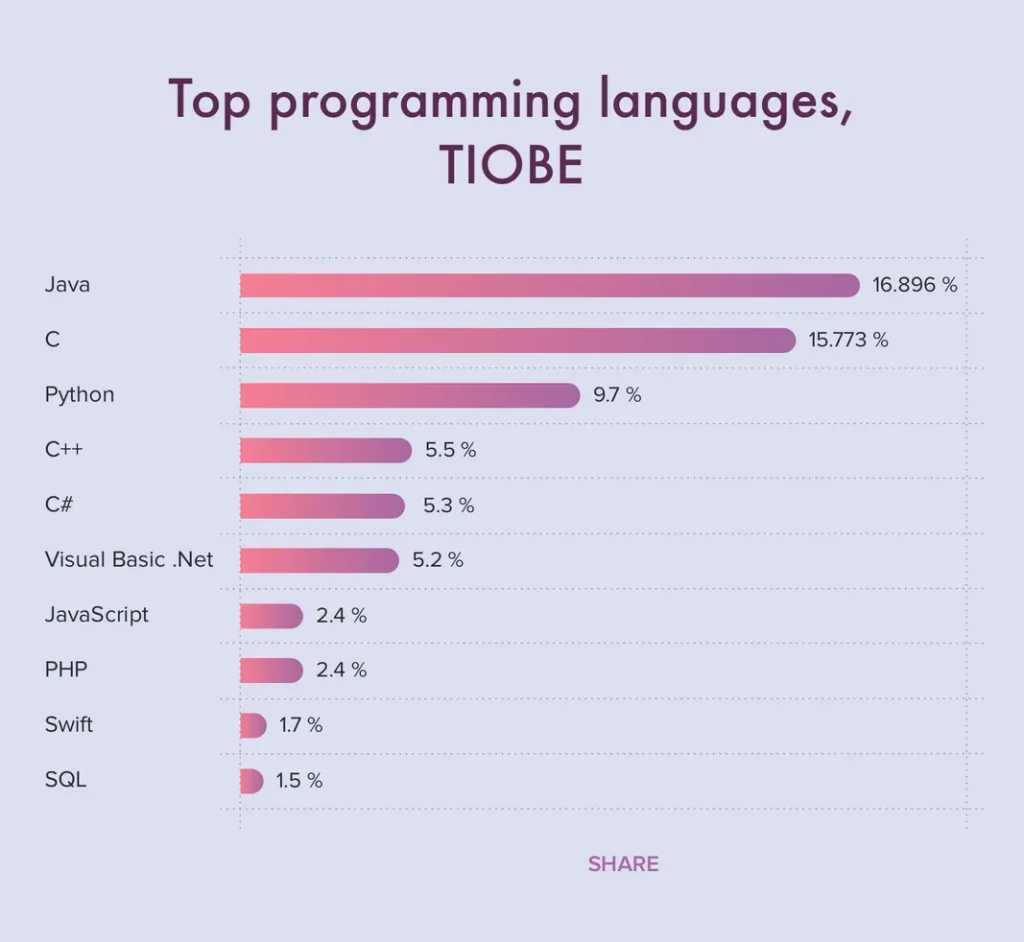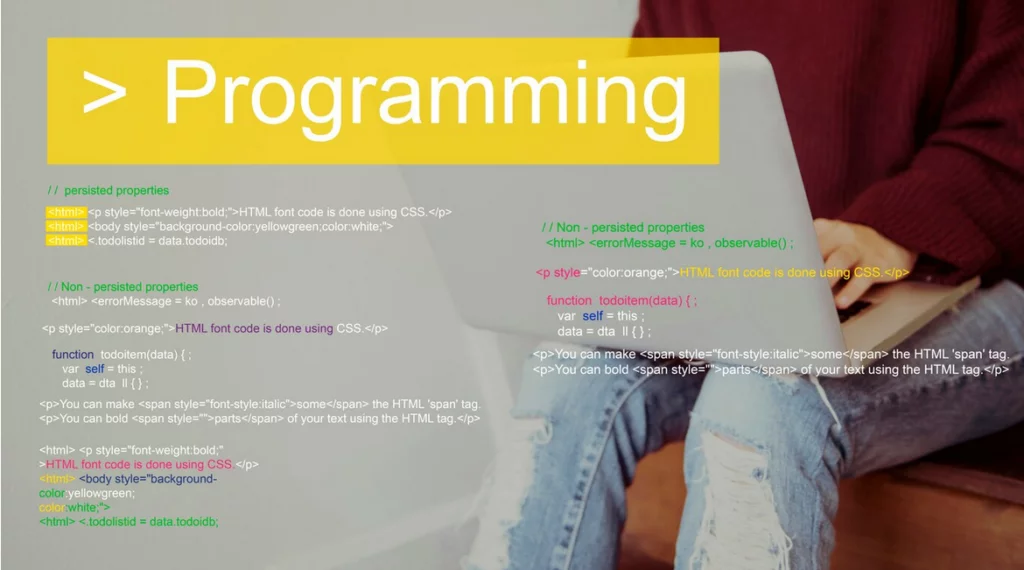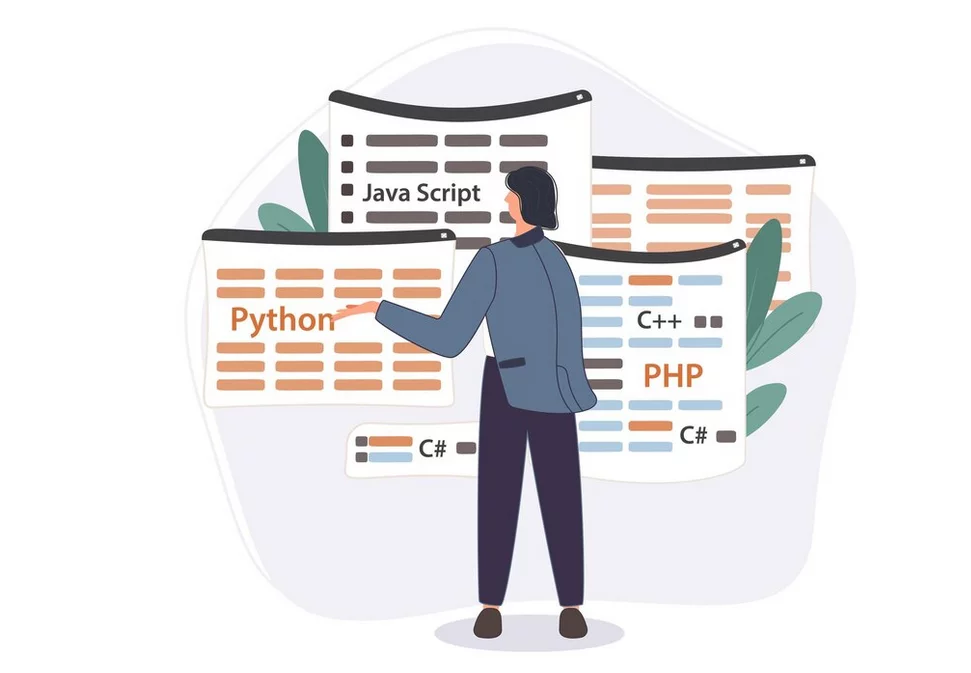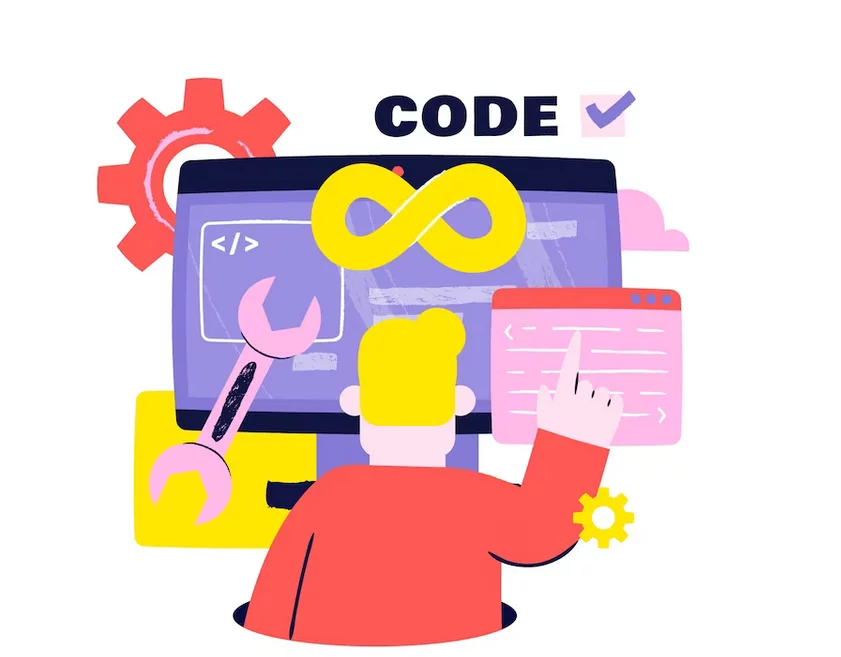eCommerce has shed its once-alienated status, becoming a recognized and enduring presence in the digital landscape. In today’s business environment, adept individuals in digital technology acknowledge the indispensable role played by the eCommerce industry. Embracing eCommerce website development is not just a passing trend; it has become necessary for sustaining and driving business growth in the contemporary digital era. Now is the opportune moment for those who have yet to explore this domain. Swift and strategic decision-making is crucial to ensure your business’s expansion and capitalize on the unique advantages of eCommerce platforms. Considering competitors may already be embarking on digital transformations, choosing the optimal programming language and developing eCommerce stores with precision and user-centric strategies is paramount.
From small startups to medium-sized businesses and large-scale enterprises, eCommerce adoption is widespread, making it imperative for your business to join the ranks. To guide you through this journey, explore the following post, which delves into the selection of programming languages for developing a robust eCommerce website. Making the right choice is pivotal and armed with the appropriate programming language, you can pave the way for generating the desired revenue. The challenge, however, lies in navigating the multitude of programming languages available in the web development realm. How do you make the proper selection amid this abundance of options?

1. Project Requirements:

- Scalability: Consider the scalability needs of your eCommerce website. A language that supports scalability will ensure that your website can handle growth in terms of traffic, products, and user interactions.
- Functionality: Outline the specific features and functionalities you want for your eCommerce platform. Different languages excel in various areas, such as real-time processing, inventory management, or payment gateways. Choose a language that aligns with your feature requirements.
2. Development Speed:

- Time to Market: Evaluate the urgency of your eCommerce website launch. Some languages and frameworks enable rapid development, which is crucial if you want to get your platform to market quickly. Frameworks like Django (Python) and Ruby on Rails (Ruby) are known for their emphasis on developer productivity.
3. Developer Skillset:

- In-House Expertise: Assess the existing skillset within your development team. Choosing a language your team knows can streamline development and reduce the learning curve. Alternatively, you may train your team in a new language if the benefits outweigh the initial investment.
4. Community and Support:

- Community Size: Consider the size and activity of the programming language’s community. A large and active community often means better support, regular updates, and a wealth of resources. Communities can be valuable for troubleshooting issues and staying updated on best practices.
5. Security:

- Vulnerabilities: Prioritize the security of your eCommerce website. Some programming languages have built-in security features, while others may require additional measures. Evaluate the language’s track record in handling security vulnerabilities and the availability of security-focused libraries.
6. Performance:

- Speed and Efficiency: Assess the performance requirements of your eCommerce platform. Some languages are known for their speed and efficiency, which can impact the user experience. Consider whether the language’s performance aligns with the expected traffic and transaction volume.
7. Integration Capabilities:

- Third-Party Integrations: eCommerce websites often rely on third-party services and integrations, such as payment gateways, shipping providers, and CRM systems. Choose a programming language that integrates with the necessary APIs and services relevant to your business.
8. Cost Considerations:
- Licensing and Development Costs: Evaluate the licensing fees associated with specific programming languages and frameworks. Additionally, consider the overall development cost, including the availability of free, open-source options versus paid solutions.
9. Platform Compatibility:

- Cross-Platform Development: Determine whether you need your eCommerce website to be compatible across multiple platforms (web, mobile, etc.). Some languages are well-suited for cross-platform development, offering a consistent user experience across different devices.
10. Future Maintenance:
- Long-Term Viability: Consider the long-term viability and support for the chosen programming language. Opt for a language likely to be relevant and well-supported in the coming years, minimizing the risk of encountering obsolete technologies.
Steps to Choose a Programming Language:
- Defining Your Application Type: The initial step in selecting a programming language is clearly defining the type you intend to develop. Whether it’s a web-based platform or a mobile application, understanding the nature of your project is crucial. Each programming language excels in specific domains – for instance, C++ is well-suited for embedded firmware, while Java is preferred for Android-based applications. Thorough research at this stage ensures that you embark on your development journey with a well-informed decision.
- Considering Size and Complexity: Beyond application type, size and complexity are pivotal for eCommerce development. Tailoring your choice of programming language to the project’s scope is essential. PHP and C# are recommended for smaller-scale projects, while Java, with its versatility, becomes a preferred choice for more intricate, medium-sized applications. This becomes particularly relevant when dealing with multiple layers and integrating various eCommerce features.
- Scalability, Performance, and Security: A critical trio of considerations involves the language’s scalability, performance, and security capabilities. The chosen language should seamlessly handle scalability to accommodate growth without compromising performance. Tech stacks like Ruby on Rails (RoR), .NET, Java Spring, LAMP, and MEAN are notable for their performance but vary in scalability. Equally important is ensuring robust security measures to safeguard against cyber threats. Whether it’s an eCommerce platform or other applications, prioritizing security features and compliance with standards like PCI or HIPAA is imperative in today’s digital landscape. Vigilance in language selection is key to a secure and successful development endeavor.
- Exploring Different Platforms: Delving into various available platforms is a critical step that should ideally commence during the project’s initial planning phase. Understanding the intricacies of the chosen platform, such as when developing a social media app like Instagram, is paramount. Your platform choice plays a significant role in determining the most suitable programming language. Versatile languages like PHP and Javascript, which are compatible with various platforms, offer reliable options. For Android applications, Java and C++, while for iOS, Objective C stands out as a preferred choice.
- Prioritizing Maintenance: Maintenance is a fundamental consideration extending beyond the development phase. Crafting an application with long-lasting impact necessitates ongoing maintenance. As technology evolves, regular updates become inevitable. Hence, selecting a programming language that facilitates seamless adaptation to these updates is essential for sustained success in your web development project.
- Optimizing Time to Market: Accelerating your app’s time to market is a key consideration for gaining a competitive edge. The choice of programming language significantly influences the speed of development. Dynamic languages such as Python, C++, and Java, particularly beneficial for cross-platform applications, can contribute to a faster development process, allowing you to launch your app swiftly and stay ahead in the dynamic market landscape.
Keep yourself abreast with latest updates in programming with podcasts.
Top Programming Languages of 2024:
1. Java:
Java stands out as a premier programming language, particularly advantageous for eCommerce development projects. Its status as an object-oriented language, coupled with robust performance and security features, makes it a top choice for diverse web development endeavors. Key attributes that position Java as a leading language for eCommerce include:
- Highly scalable
- Platform-independent
- Strong security measures
- Easy maintenance
- Impressive performance
Java’s dominance as a server-side language further solidifies its preference for large-scale development projects. Despite its longstanding presence, Java remains actively developed, with the latest Long-Term Support (LTS) release being Java 21, featuring essential advancements.
2. PHP:
PHP emerges as a vital programming language, especially in the dynamic landscape of eCommerce development. Given the evolving nature of eCommerce, selecting the correct programming language is crucial, and PHP fits the bill perfectly. As a server-side scripting language, PHP offers simplicity and versatility. Key reasons why PHP is widely embraced in web development projects include:
- Open-source nature fostering innovation
- Cost-effective development without licensing fees
- Seamless integration with databases like MySQL, PostgreSQL
- Robust security features when implemented by proficient eCommerce development companies
PHP addresses security concerns effectively through best practices, making it an ideal choice for building dynamic eCommerce platforms.
3. Python:
Python is a tried-and-tested programming language with a rich history of contributing to various website developments. Its core attributes, including high efficiency, enhanced productivity, robustness, readability, and broad compatibility, make it an excellent choice for eCommerce site development. Consider Python for:
- Building secured websites
- Enhancing flexibility and scalability
- Leveraging excellent community support
- Providing a beginner-friendly language
- Facilitating easy maintenance
4. Javascript:
Considered the world’s most-utilized programming language, Javascript holds a prominent position in eCommerce due to its dynamic and object-oriented capabilities. Renowned for its ease of learning, versatility, and high scalability, Javascript is pivotal in the eCommerce landscape, powering approximately 98% of present-day websites. Beyond end-user experiences, Javascript is an attractive choice for front and backend developers globally. Key benefits of opting for Javascript as the primary language in your eCommerce web development project include:
- Cross-platform compatibility
- Exceptional performance and speed
- Support for real-time interaction and straightforward administration
- Quick learning curve
- Excellent suitability for developing and managing eCommerce stores
Javascript proves its prowess in enhancing user experiences and streamlining development processes.
5. C++:
Despite being acknowledged as one of the most intricate programming languages, C++ holds a distinguished status in web development. C++ offers a combination of easy scalability, security, and flexibility, making it a leading choice for various projects. Some key attributes of C++ that contribute to its prominence include:
- Competent interoperability
- Advanced readability
- Extensive community support
- User-friendly interface
Before finalizing a decision, consider additional questions to refine your choice:
- Does the programming language possess proper ecosystem support?
- Is the project-oriented towards web or mobile applications?
- Are there specific preferences guiding your language selection?
- Are there requirements for particular libraries, features, or tools?
- Do constraints such as time, budget, or other resources impact the decision?
- Are there specific security considerations, including seamless third-party integration tools?
6. Ruby:
Ruby, recognized for its elegant syntax and focus on developer happiness, is frequently paired with the Ruby on Rails framework, making it a popular choice for eCommerce development. The language’s readability and simplicity contribute to a productive coding environment, allowing developers to craft sophisticated and maintainable eCommerce applications. When meticulously considering a language for your eCommerce site, particularly if you value clean and expressive code, Ruby should undoubtedly be considered.
Consider it for:
- Projects that prioritize developer satisfaction and elegant code.
- eCommerce applications where simplicity and readability are crucial.
7. TypeScript:
TypeScript, an extension of JavaScript, introduces static typing, offering early error detection during development. This feature proves invaluable for large-scale eCommerce projects, enhancing code maintainability and reducing bugs. Consider TypeScript when emphasizing catching potential issues early in development to ensure a robust and reliable codebase for your eCommerce platform.
Consider it for:
- Projects where early error detection and strong typing are essential.
- Large-scale eCommerce platforms with a focus on maintainability.
8. Swift:
Apple’s preferred language for iOS app development is indispensable if your eCommerce platform targets iOS users. Known for its performance and responsiveness, Swift is crucial in delivering a seamless and user-friendly mobile shopping experience. Consider Swift when iOS compatibility is a top priority, ensuring your eCommerce application aligns seamlessly with Apple devices.
Consider it for:
- eCommerce projects prioritizing a responsive and high-performance iOS app.
- Applications where a smooth user experience on Apple devices is critical.
9. Go (Golang):
Renowned for efficiency and scalability, Go (Golang) excels in crafting high-performance and concurrent applications. This language is well-suited for handling substantial data loads and ensuring swift response times. Consider Go (Golang) if scalability and efficient concurrency are paramount for your eCommerce project, providing the capability to meet these demands effectively.
Consider it for:
- Projects requiring high efficiency and scalability.
- eCommerce applications with a focus on concurrent processing and quick response times.
10. Kotlin:
Kotlin, often utilized in Android app development, is a versatile language suitable for building cross-platform eCommerce applications. With concise syntax and seamless interoperability with Java, Kotlin offers flexibility. Consider Kotlin when aiming for a cross-platform eCommerce solution that leverages Java libraries, providing a balanced combination of concise coding and cross-platform capabilities.
Consider it for:
- Cross-platform eCommerce projects leveraging Java libraries.
- Applications require a concise coding style and versatility.
Conclusion:
In conclusion, the choice of a programming language significantly shapes the success of an eCommerce development project. Whether opting for Java’s performance and security, leveraging PHP’s versatility and cost-effectiveness, or harnessing Python’s efficiency and productivity, each language plays a crucial role in creating a robust, scalable, and user-centric eCommerce platform. Careful consideration of these language attributes ensures a solid foundation for development, meeting the dynamic demands of the eCommerce industry.
FAQs on Programming Language:
Can the choice of a programming language impact the speed and performance of an eCommerce website?
Yes, the programming language directly influences the speed and performance of an eCommerce site. Opting for languages known for efficiency and performance, such as Java or Python, can contribute to faster loading times and a smoother user experience.
What considerations should be made for cross-platform compatibility in eCommerce development?
For eCommerce websites targeting a diverse user base, cross-platform compatibility is essential. The chosen programming language should support cross-platform development, ensuring a consistent and optimized experience across various devices and operating systems.
What are the implications of choosing an open-source programming language for eCommerce development?
Selecting an open-source programming language, such as PHP or Python, can provide cost-effective solutions and foster collaboration within the developer community. However, considerations should be made regarding security measures and ongoing support.
When choosing a programming language, are there specific considerations for real-time features and functionalities in eCommerce websites?
Yes, real-time features, such as live chat or dynamic updates, require a programming language with solid support for asynchronous operations. Choosing a language with capabilities like event-driven architecture can enhance real-time functionalities in an eCommerce setting.



